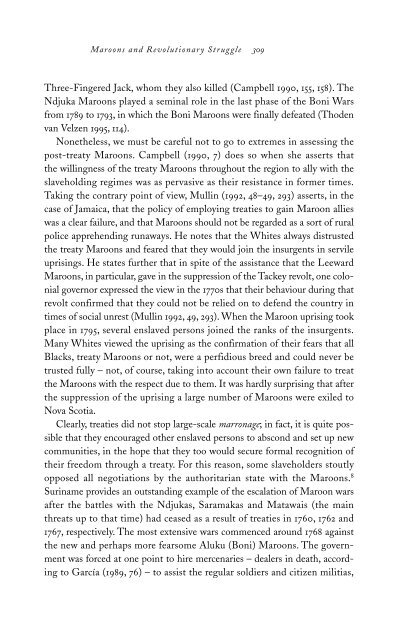60199616-flight-to-freedom-african-runaways-and-maroons-in-the-americas
60199616-flight-to-freedom-african-runaways-and-maroons-in-the-americas
60199616-flight-to-freedom-african-runaways-and-maroons-in-the-americas
Create successful ePaper yourself
Turn your PDF publications into a flip-book with our unique Google optimized e-Paper software.
Maroons <strong>and</strong> Revolutionary Struggle<br />
309<br />
Three-F<strong>in</strong>gered Jack, whom <strong>the</strong>y also killed (Campbell 1990, 155, 158). The<br />
Ndjuka Maroons played a sem<strong>in</strong>al role <strong>in</strong> <strong>the</strong> last phase of <strong>the</strong> Boni Wars<br />
from 1789 <strong>to</strong> 1793, <strong>in</strong> which <strong>the</strong> Boni Maroons were f<strong>in</strong>ally defeated (Thoden<br />
van Velzen 1995, 114).<br />
None<strong>the</strong>less, we must be careful not <strong>to</strong> go <strong>to</strong> extremes <strong>in</strong> assess<strong>in</strong>g <strong>the</strong><br />
post-treaty Maroons. Campbell (1990, 7) does so when she asserts that<br />
<strong>the</strong> will<strong>in</strong>gness of <strong>the</strong> treaty Maroons throughout <strong>the</strong> region <strong>to</strong> ally with <strong>the</strong><br />
slavehold<strong>in</strong>g regimes was as pervasive as <strong>the</strong>ir resistance <strong>in</strong> former times.<br />
Tak<strong>in</strong>g <strong>the</strong> contrary po<strong>in</strong>t of view, Mull<strong>in</strong> (1992, 48–49, 293) asserts, <strong>in</strong> <strong>the</strong><br />
case of Jamaica, that <strong>the</strong> policy of employ<strong>in</strong>g treaties <strong>to</strong> ga<strong>in</strong> Maroon allies<br />
was a clear failure, <strong>and</strong> that Maroons should not be regarded as a sort of rural<br />
police apprehend<strong>in</strong>g <strong>runaways</strong>. He notes that <strong>the</strong> Whites always distrusted<br />
<strong>the</strong> treaty Maroons <strong>and</strong> feared that <strong>the</strong>y would jo<strong>in</strong> <strong>the</strong> <strong>in</strong>surgents <strong>in</strong> servile<br />
upris<strong>in</strong>gs. He states fur<strong>the</strong>r that <strong>in</strong> spite of <strong>the</strong> assistance that <strong>the</strong> Leeward<br />
Maroons, <strong>in</strong> particular, gave <strong>in</strong> <strong>the</strong> suppression of <strong>the</strong> Tackey revolt, one colonial<br />
governor expressed <strong>the</strong> view <strong>in</strong> <strong>the</strong> 1770s that <strong>the</strong>ir behaviour dur<strong>in</strong>g that<br />
revolt confirmed that <strong>the</strong>y could not be relied on <strong>to</strong> defend <strong>the</strong> country <strong>in</strong><br />
times of social unrest (Mull<strong>in</strong> 1992, 49, 293). When <strong>the</strong> Maroon upris<strong>in</strong>g <strong>to</strong>ok<br />
place <strong>in</strong> 1795, several enslaved persons jo<strong>in</strong>ed <strong>the</strong> ranks of <strong>the</strong> <strong>in</strong>surgents.<br />
Many Whites viewed <strong>the</strong> upris<strong>in</strong>g as <strong>the</strong> confirmation of <strong>the</strong>ir fears that all<br />
Blacks, treaty Maroons or not, were a perfidious breed <strong>and</strong> could never be<br />
trusted fully – not, of course, tak<strong>in</strong>g <strong>in</strong><strong>to</strong> account <strong>the</strong>ir own failure <strong>to</strong> treat<br />
<strong>the</strong> Maroons with <strong>the</strong> respect due <strong>to</strong> <strong>the</strong>m. It was hardly surpris<strong>in</strong>g that after<br />
<strong>the</strong> suppression of <strong>the</strong> upris<strong>in</strong>g a large number of Maroons were exiled <strong>to</strong><br />
Nova Scotia.<br />
Clearly, treaties did not s<strong>to</strong>p large-scale marronage; <strong>in</strong> fact, it is quite possible<br />
that <strong>the</strong>y encouraged o<strong>the</strong>r enslaved persons <strong>to</strong> abscond <strong>and</strong> set up new<br />
communities, <strong>in</strong> <strong>the</strong> hope that <strong>the</strong>y <strong>to</strong>o would secure formal recognition of<br />
<strong>the</strong>ir <strong>freedom</strong> through a treaty. For this reason, some slaveholders s<strong>to</strong>utly<br />
opposed all negotiations by <strong>the</strong> authoritarian state with <strong>the</strong> Maroons. 8<br />
Sur<strong>in</strong>ame provides an outst<strong>and</strong><strong>in</strong>g example of <strong>the</strong> escalation of Maroon wars<br />
after <strong>the</strong> battles with <strong>the</strong> Ndjukas, Saramakas <strong>and</strong> Matawais (<strong>the</strong> ma<strong>in</strong><br />
threats up <strong>to</strong> that time) had ceased as a result of treaties <strong>in</strong> 1760, 1762 <strong>and</strong><br />
1767, respectively. The most extensive wars commenced around 1768 aga<strong>in</strong>st<br />
<strong>the</strong> new <strong>and</strong> perhaps more fearsome Aluku (Boni) Maroons. The government<br />
was forced at one po<strong>in</strong>t <strong>to</strong> hire mercenaries – dealers <strong>in</strong> death, accord<strong>in</strong>g<br />
<strong>to</strong> García (1989, 76) – <strong>to</strong> assist <strong>the</strong> regular soldiers <strong>and</strong> citizen militias,


